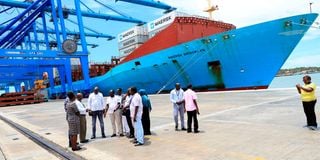KPA to raise port fees in new revenue, profit plan

The Port of Mombasa on March 28, 2023.
What you need to know:
- KPA last month initiated plans to lease some of its key assets as part of an ambitious plan by the State to revitalise the country’s maritime industry.
- KPA is currently pressed to maximise on revenue collection and has deployed diverse strategies including wooing traders with longer free storage windows.
The Kenya Ports Authority (KPA) targets a major review of its current service tariffs amid pressure for extra revenue to finance capital projects, boost gross margins and deal with inflation squeeze.
The authority, which is tasked with managing Kenya’s ports and inland container depots, said the new tariffs would apply for the period 2024-2028.
“The current KPA tariff was approved effective December 1, 2012, and has been in force ever since with several minor amendments in due course. The management is desirous to review tariff in its endeavor to provide adequate capacity and offer quality services to vessels calling at its ports and inland facilities,” said KPA.
“This takes cognisance of the authority’s overarching need to meet financial objectives relating to recovery of costs, profitability, and operational objectives to improve service delivery thereby sustaining competitiveness,” it added in the call for a consultant to drive the review.
The port operator indicated that the proposed tariff review would cover for adjustments for inflation and a slump in exchange rates besides opening fresh revenue streams to fund infrastructure expansion projects.
“The tariff review exercise has been purposed by inter alia; changes in the economic environment in which KPA operates (inflation, exchange rate, interest rates, technology) and leveraging on the standard gauge railway (SGR) for off take of cargo from the port by promoting the use of Madaraka Freight Service and the Inland Containers Depots(ICDs) for efficient transport in the corridor,” said KPA.
Pressed for funds, KPA last month initiated plans to lease some of its key assets as part of an ambitious plan by the State to revitalise the country’s maritime industry through public-private partnerships (PPPs).
“The Kenya Ports Authority invites sealed bids from eligible tenderers for qualification of bidders for the development and operation of port assets through PPP (Lamu container terminal berth 1-3, Lamu Special Economic Zone, Mombasa port’s berth 11-14 and Mombasa port container terminal 1,” KPA Managing Director William Ruto said in a tender call.
The tender call by KPA came months after the Kenya Development Corporation (KDC), a development finance institution, disclosed the Kenya Kwanza administration was scouting for private players to run sections of Kilindini Harbour, Dongo Kundu Port, Lamu Port, Kisumu Port, and Shimoni Fisheries Port in an ambitious Sh1.4trillion plan that is aimed at making the northern corridor competitive.
“The ports are confronted with the challenge of congestion and, therefore, higher dwell times for cargo. The ports will be leased/concessioned to private operators with landlord-type port management system,” states the KDC in its pitch to potential investors.
The State projects to raise Sh1.4 trillion through the PPP exercise. Further, the government is seeking up to Sh45.46 billion ($304 million) worth of private investment into the Port of Lamu, with a big chunk of the money being used to develop the port’s agribulk and liquid bulk terminals.
KPA is currently pressed to maximise on revenue collection and has deployed diverse strategies including wooing traders with longer free storage windows. Last month, the agency doubled the free cargo storage window for domestic importers to four days from two previously, handing relief to thousands hard-pressed for cash to clear their consignments.
In the new review, the $45 (Sh 6,731.84) and $90 (Sh13,464.02) demurrage fees that were previously charged on the seventh day will now be charged on the 21st day-- giving relief to importers and exporters whose cargo delay on various port facilities within the country.
Previously, local port users were charged a demurrage fee after the expiry of two days but in the new tariffs, traders have four days to clear the cargo from port facilities before it starts attracting storage fees.





